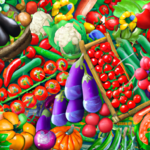Why aren’t you a vegan?
Have you ever wondered why, despite the growing popularity of veganism, you haven’t made the switch? Well, it’s not uncommon to have personal dietary and taste preferences that prevent you from embracing a vegan lifestyle. Perhaps you haven’t had enough exposure or knowledge about the benefits and principles of veganism, or maybe your social and cultural influences have shaped your eating habits differently.
Additionally, the convenience and accessibility of non-vegan food options may play a role in your decision. Concerns about nutritional adequacy might be holding you back as well. And let’s not forget about emotional attachments to animal products that can make it difficult to break old habits. Financial considerations could also be influencing your choice.
Whatever the reasons may be, it’s important to explore them with an open mind and consider whether they align with your values and goals for a healthier, more sustainable future.
Key Takeaways
- Personal dietary and taste preferences can prevent people from embracing a vegan lifestyle.
- Lack of exposure and knowledge about the benefits and principles of veganism can hinder the transition.
- Convenience and accessibility of non-vegan food options play a role in the decision.
- Concerns about nutritional adequacy and misconceptions about veganism can hold people back from going vegan.
Personal Dietary Preferences and Taste Preferences
I totally get it if you’re not a fan of certain foods or flavors, but have you ever tried exploring different plant-based options to see if there’s something that suits your personal taste preferences?
It’s important to consider that being vegan doesn’t mean giving up all the flavors and textures you love. In fact, there are countless delicious plant-based alternatives out there waiting to be discovered.
When it comes to personal dietary preferences, it’s understandable that everyone has their own unique tastes and cravings. But have you ever thought about how your food choices align with your personal ethical beliefs?
Going vegan isn’t only about personal health concerns; it also addresses ethical concerns related to animal welfare and environmental sustainability. By choosing plant-based options, you can contribute positively towards reducing animal suffering and minimizing your carbon footprint.
Nowadays, the variety of vegan options available on the market is astonishing. You can find everything from mouth-watering burgers made from plant proteins to creamy dairy-free ice creams that rival their traditional counterparts.
These alternatives allow you to enjoy familiar flavors while making a positive impact on your health and the world around you.
So why not give it a try? Explore different plant-based options and see if there’s something that matches your taste preferences. You might be surprised by how delicious and satisfying these alternatives can be while still aligning with your personal ethical beliefs and health concerns.
Lack of Awareness or Knowledge about Veganism
Unawareness and limited knowledge about veganism often hinder the transition to a plant-based lifestyle. It’s not surprising that many people are hesitant to become vegans when they don’t fully understand what it entails.
Veganism is not widely represented in popular media, which means that many individuals may have misconceptions about it. In movies, TV shows, and advertisements, vegan characters are often portrayed as extreme or eccentric. This can create an image of veganism as something strange or unattainable for the average person.
Additionally, there are common misconceptions that being a vegan means only eating salads or depriving oneself of delicious food. However, this couldn’t be further from the truth. There is a lack of awareness about the variety of delicious and nutritious foods that can be enjoyed on a vegan diet. From hearty vegetable stews to flavorful tofu stir-fries, there are countless options available that can satisfy even the most discerning taste buds.
To address these misconceptions and increase awareness about veganism, it’s important for advocates to promote positive representations of plant-based lifestyles in popular media. By showcasing diverse individuals who enjoy vibrant and fulfilling lives as vegans, more people will realize that embracing this lifestyle doesn’t mean sacrificing flavor or enjoyment.
Ultimately, increasing awareness and debunking myths surrounding veganism will help more individuals make informed choices about their dietary preferences and potentially consider adopting a plant-based lifestyle themselves.
Social and Cultural Influences
Popular culture often depicts veganism as unusual or unattainable, leading many individuals to have misconceptions about the lifestyle and its cultural influences.
One of the reasons you may not be a vegan is because of peer pressure and the desire for social acceptance. In a society that often revolves around shared meals and food choices, it can be challenging to break away from the norm and adopt a vegan lifestyle. You might worry about what your friends or colleagues will say if you choose plant-based options over traditional ones.
Additionally, the influence of family and upbringing can play a significant role in your decision not to become a vegan. If your family has always followed certain dietary traditions or values centered around animal products, it can be difficult to challenge those beliefs. Family gatherings and special occasions may revolve around specific dishes that are not vegan-friendly, making it challenging to fully embrace a plant-based lifestyle without feeling like an outcast.
Belonging is important to human beings, and sometimes conforming to societal norms feels safer than standing out. The fear of being judged or excluded can outweigh the desire to adopt a vegan lifestyle. However, it’s essential to remember that true belonging comes from aligning with our values and making choices that are consistent with them. By educating yourself about veganism and finding supportive communities online or in person, you can navigate these social and cultural influences while still living according to your own principles.
Convenience and Accessibility of Non-Vegan Food Options
The convenience and accessibility of non-vegan food options can make it incredibly difficult to resist indulging in them, even when you know the negative impact they have on your health and the environment. Limited options and time constraints often play a significant role in preventing individuals from adopting a vegan lifestyle.
When you’re rushing to work or trying to grab a quick bite between errands, finding vegan options can be challenging. Many fast-food chains and restaurants heavily rely on meat and dairy products, offering only limited alternatives for those seeking plant-based meals. This lack of variety makes it easy to give in to the temptation of convenient non-vegan choices.
To evoke an emotional response, let’s look at two scenarios side by side:
| Scenario 1: | Scenario 2: |
|---|---|
| You’re running late for work and there’s no time to prepare breakfast. The drive-thru offers bacon, egg, and cheese sandwiches that you’ve always enjoyed. It’s familiar and satisfying. | Imagine having a wide array of delicious vegan breakfast options readily available at every corner – mouthwatering tofu scrambles, veggie-packed breakfast burritos, or creamy oatmeal bowls topped with fresh fruits. A guilt-free start to your day that aligns with your values. |
As humans who desire belonging, it is natural to seek familiarity and convenience in our daily routines. However, recognizing the limited options available due to time constraints can help pave the way towards embracing more sustainable choices in our diet.
Concerns about Nutritional Adequacy
When it comes to adopting a plant-based diet, one concern you may have is whether or not you can meet your nutritional needs. It’s completely understandable to worry about this, especially if you have dietary restrictions or ethical concerns. However, rest assured that it is absolutely possible to maintain a healthy and well-balanced vegan lifestyle.
Many people believe that a vegan diet lacks essential nutrients such as protein, iron, calcium, and vitamin B12. While it’s true that these nutrients are commonly found in animal products, they can also be obtained from plant-based sources. For example, protein can come from beans, lentils, tofu, and quinoa; iron from leafy greens and legumes; calcium from fortified non-dairy milk and green vegetables; and vitamin B12 from fortified foods or supplements.
To ensure nutritional adequacy on a vegan diet, it’s important to plan your meals carefully and diversify your food choices. Including a variety of fruits, vegetables, whole grains, nuts, seeds, and plant-based proteins will help you meet all your nutrient requirements.
Remember that there are many resources available online and in books to guide you on your journey towards a nutritionally adequate vegan lifestyle. Don’t hesitate to seek advice from registered dietitians who specialize in plant-based diets for personalized guidance.
With the right knowledge and planning, you can thrive on a vegan diet while meeting all your nutritional needs.
Emotional and Psychological Attachments to Animal Products
Imagine the bittersweet nostalgia that arises when you bite into a warm, flaky croissant, knowing it’s the last time you’ll indulge in that buttery goodness. It’s not just about the taste, but also the emotional connection and attachment we have to certain animal products.
For many people, animals are more than just a source of food; they become beloved pets and companions. The thought of giving up meat and dairy can be daunting because it means letting go of those emotional ties.
There is a deep sense of belonging that comes from sharing our lives with animals. Whether it’s the loyal wag of a dog’s tail or the gentle purring of a cat, these connections bring us joy and comfort. It’s not easy to sever these bonds by completely eliminating animal products from our diets.
Additionally, society often reinforces this emotional attachment to animal products. From childhood memories of family barbecues to cultural traditions centered around meat-based dishes, these experiences create a sense of identity and belonging. The fear of losing out on these shared experiences can make it difficult to embrace veganism.
While nutritional concerns may play a role in people’s choice not to be vegans, it’s important to acknowledge the powerful emotional and psychological attachments we have towards animal products as well. Finding ways to navigate this complex relationship can help bridge the gap between personal values and dietary choices.
Financial Considerations and Affordability
Don’t let financial worries hold you back from exploring the affordability of plant-based options. It’s understandable that budget constraints may play a role in your decision-making process when it comes to choosing what to eat.
However, it’s important to consider the cost of vegan alternatives and how they can fit into your lifestyle.
While it’s true that some vegan products can be more expensive than their animal-based counterparts, there are plenty of affordable options available. Incorporating more fruits, vegetables, grains, and legumes into your diet can be both healthy and cost-effective. These whole foods are often cheaper than meat or dairy products and provide essential nutrients for your body.
Additionally, cooking meals at home using plant-based ingredients can save you money compared to eating out or relying on processed foods. With a little planning and creativity, you can create delicious and satisfying meals without breaking the bank.
It’s also worth noting that as demand for vegan products continues to rise, prices are becoming more competitive. Many stores now offer affordable plant-based options that cater to all budgets.
So don’t let financial concerns deter you from exploring a vegan lifestyle. With careful consideration and some adjustments, you can find affordable ways to incorporate plant-based alternatives into your diet while still enjoying delicious meals and satisfying cravings.
Conclusion
So, why aren’t you a vegan? It could be because of your personal dietary preferences and taste preferences. Maybe you just haven’t been exposed to enough information about veganism or haven’t fully understood its benefits.
Social and cultural influences may also play a role in your decision, along with the convenience and accessibility of non-vegan food options. Concerns about nutritional adequacy, emotional attachments to animal products, and financial considerations could also be factors.
Ultimately, the choice to be vegan is a personal one that depends on various individual circumstances.




Recent Comments